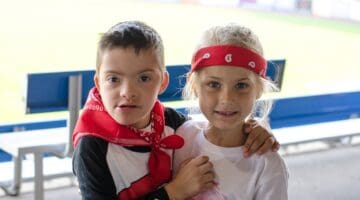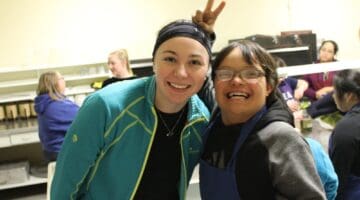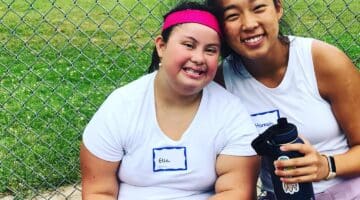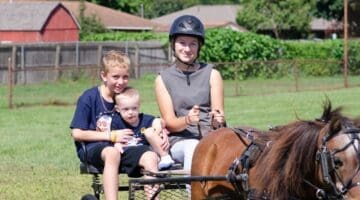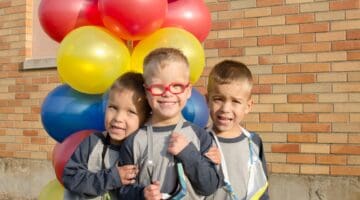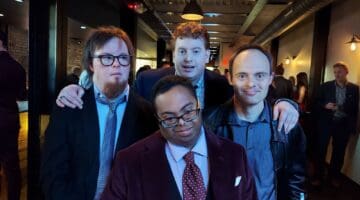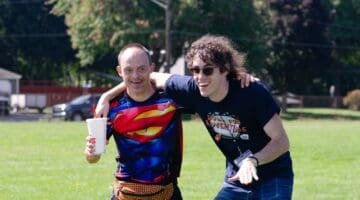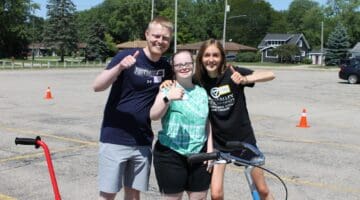Understanding Down Syndrome
One of every 700 babies born in the United States is diagnosed with Down syndrome. This chromosomal condition occurs when an individual has three, rather than two, copies of their 21st chromosome. The additional genetic material alters the course of development, affecting how a person may learn, speak, or look.
While the cause of the extra full or partial chromosome is still unknown, we do know that Down syndrome affects people of all ages, ethnicities, and socio-economic backgrounds.
With early intervention, loving homes, quality education, appropriate medical care, and positive public attitudes, people with Down syndrome develop to their full potential. Children with Down syndrome often participate in regular classrooms, learn to read, and enjoy integrated community activities. Many adults hold jobs, form lasting relationships, vote, and live independently.
By supporting and advocating together, we show the world that people with Down syndrome are truly more alike than they are different!
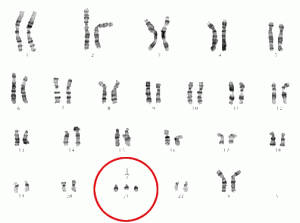
A karyotype shows the presence of three copies of the 21st chromosome, indicating Down syndrome.
Let’s Talk About Down Syndrome
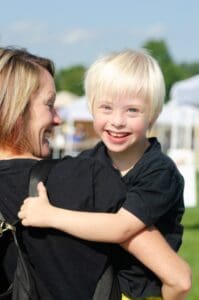 As a friend, family member, or community relation of a person with Down syndrome, your words can impact the way that people feel about themselves or are viewed by others. By speaking about Down syndrome and people with Down syndrome in a positive and accurate manner, you have the opportunity to help shape perceptions. Together we can use our words to make individuals with Down syndrome and their families feel empowered and welcomed in our communities.
As a friend, family member, or community relation of a person with Down syndrome, your words can impact the way that people feel about themselves or are viewed by others. By speaking about Down syndrome and people with Down syndrome in a positive and accurate manner, you have the opportunity to help shape perceptions. Together we can use our words to make individuals with Down syndrome and their families feel empowered and welcomed in our communities.
The correct name of this diagnosis is Down syndrome.
Not “Downs” or “Down’s”. The “s” in syndrome is not capitalized. Down syndrome is named for John Langdon Down, the 19th century physician who first classified the condition. It is also acceptable to refer to Down syndrome as Trisomy 21. This is a technical term used because Down syndrome is caused by the triplication (trisomy) of the 21st chromosome. Down syndrome is the most commonly used name.
People with Down syndrome are people first and foremost.
Saying “Down’s person” or “Down syndrome person” implies that Down syndrome should be the focus. Down syndrome is something someone has, not something that someone is. Keep your emphasis on the person, not the disability. Try saying “person/child/baby with Down syndrome” instead. We call this person-first language.
A person has Down syndrome, but it doesn’t define him or her.
People with Down syndrome have unique personalities and traits that are not related to Down syndrome. When speaking, say that a person “has Down syndrome,” not that a person “is Down syndrome.” This places the focus on the person, not the disability.
People with Down syndrome have an intellectual disability (ID).
The United States government, American medical and psychiatric professionals, and the World Health Organization no longer use the term “mental retardation.” Instead, use the term “intellectual disability.” “Mongolism,” “mongoloid,” and “handicapped” are also outdated terms. It is most appropriate to say a person with Down syndrome has an intellectual disability (ID) or developmental disability.
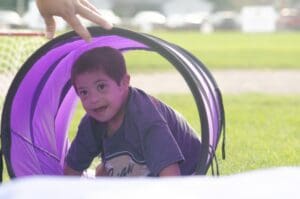 There is no such thing as “a little bit of Down syndrome.”
There is no such thing as “a little bit of Down syndrome.”
A person either has Down syndrome or does not. There is not a scale for Down syndrome. There is no such thing as severe or mild Down syndrome. Down syndrome impacts people differently because people are different. People with Down syndrome have different strengths and weaknesses just like all humans, not because they have varying degrees of the condition.
Use neutral terminology.
A person has Down syndrome, rather than “suffers from,” “is the victim of,” or “is afflicted with” Down syndrome. It is important to instill a sense of pride in all children. Having Down syndrome is not something terrible or shameful.
End the R-word.
It is not okay to say “retard” even if you are not talking about someone with a disability. The R-word is hurtful and represents the discrimination and degradation of people with disabilities. Using it in this manner equates unintelligent or silly behavior with having an intellectual disability, which is cruel and unfair to the millions of thoughtful, capable, contributing members of our society who do have a disability.
Normal is a setting on a washing machine.
“Normal” is a subjective word. By referring to someone without Down syndrome as “normal,” we imply that there is something wrong with people who are different. When speaking about a person who does not have a disability, refer to him or her as “neurotypical” or “does not have a disability.” These terms are accurate and neutral.
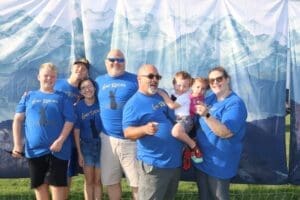 People with Down syndrome are not all the same.
People with Down syndrome are not all the same.
Try not to use stereotypes and clichés when describing an individual with Down syndrome. For example, people with Down syndrome are not always happy. They experience complex emotions, just like everyone else. These types of stereotypes take away a person’s individuality and prevent others from seeing who he or she really is.
Talk about the person, not the diagnosis.
Most importantly, look at a person with Down syndrome as an individual. Your family member, student, coworker, or new friend has lots of unique personality traits, interests, and skills. Acknowledge his or her individuality and accomplishments. Remember that a person with Down syndrome is just that—a person.
That doesn’t mean you can’t talk about Down syndrome!
It’s okay to ask a person with Down syndrome or a family member about the diagnosis as long as you ask in a manner that respects the individual and his or her privacy. If you don’t understand a term, or are unsure about what language is appropriate, just ask. We are all learning together.
Talking to Kids About Down Syndrome
Society is beginning to realize that most children with Down syndrome learn better when taught alongside typically developing kids. Including children with disabilities in standard education classes, with appropriate classroom supports, enriches the learning experience for ALL children.
But kids have questions.
Parents have questions.
For parents, “those” kids weren’t in our classes when we were in school, so we don’t have much information about their unique gifts and challenges.
Use the Q&A below to talk with your kids-and educate yourself-about Down syndrome. By taking the time to learn more about our peers with Down syndrome, we open the door to new friendships and opportunities to be advocates in our own communities.
And remember! If your child doesn’t understand a term, or is unsure about what language is appropriate, encourage them to ask. We are all learning together.
Reading List for Kids
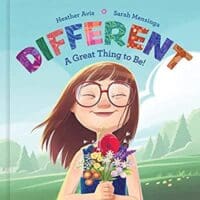
Different: A Great Thing To Be
by Heather Avis and Sarah Mensinga (2021)
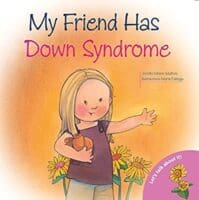
My Friend Has Down Syndrome
by Jennifer Moore-Mallinos (2008)
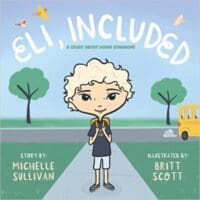
Eli, Included
by Michelle Sullivan (2019)

A Friend Like Anian
by Meeka Caldwell (2020)
